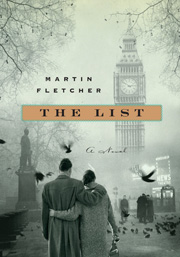By Joel Magalnick, Editor, JTNews
We have seen plenty of literature, films and nonfiction about the horrors of the Holocaust. Even more so now as the survivors of those horrific years are passing away in ever greater numbers. What has not been nearly as well documented has been the immediate aftermath: The refugees, the homeless, the ongoing hatred of Jews in countries that had often served as safe havens during the war as well as those that did not.
That is what makes The List unique. Well-regarded NBC reporter Martin Fletcher has set his first foray into fiction in the fall of 1945 with a story about the everyday lives of a group of survivors, in particular a young couple who found love on the run from the Nazis and must now make lives for themselves in their adopted country of England.
Nothing, as they discover, is easy. Strong-willed Edith escaped from her home in Vienna mere minutes before the Gestapo came with arrest papers in her name. Despite her doctor’s orders to rest, she continues her work as a seamstress while fighting off the anxiety of the impending birth of her first child. Georg is a lawyer unable to find work in a climate where any job worth having is being reserved for the soldiers returning from the front.
The couple lives in a boarding house with several other survivors and the home’s owners, who face pressure from their neighbors to evict these welfare-sucking, ungrateful Jews who should return “home” now that the war is over — Britain’s military heroes need housing, after all.
Neither Georg nor Edith knows many details of what happened to their families. They, like the circle of refugee friends they have created, continually check the boards at the welfare offices and Red Cross for a glimmer of hope about a surviving family member or, more commonly, confirmation of death. The book’s title refers to a list that Edith and Georg keep of their own family members, and the names they continue to cross out.
But finally Edith receives some good news. Her cousin Anna — beautiful, gregarious Anna — comes to stay with them. Yet they hardly recognize each other on the train platform when Anna arrives from the other side of hell. It’s clear she has experienced unspeakable horrors, and the tension of Edith’s desperate need to know what happened to her father against Anna’s need to keep what was done to her buried as deeply as possible is palpable.
Then there’s the shadowy, anti-Semitic Egyptian Ismael, whose overtures to this damaged young woman appear creepy and inappropriate. But are they really? Edith cannot bring herself to trust this strange, dark man who constantly makes rude comments. Yet more than once he appears in the right place at the right time to save Georg and his friends from that era’s version of skinhead thugs.
While this multifaceted cast of characters deals with its own problems, swirling around them are meetings held by groups who want to “send the aliens home.” The meetings are packed, hot and contentious. Different people stand up to give different voices to each grievance, many of them legitimate. In the end, the strong, pregnant Edith somewhere finds the strength to defend her fellow refugees, saving the day — at least in this scene of the story.
It’s these scenes where the novel begins to run into trouble. Fletcher paints a picture sympathetic to these people’s plights while remaining unafraid to gloss over the hardship they endure to keep themselves fed and clothed, or the extreme sadness they feel about losing yet another family member while trying to keep positive outlooks on their own futures.
But Martin Fletcher the journalist has trouble making the leap to Martin Fletcher the novelist. Like any good journalist, he shows a natural inclination to get all sides of the story. But because each of these characters represents a different viewpoint, they end up becoming the perspective itself instead of multi-dimensional people.
Fletcher puts us inside all of the heads of this cast of characters — sometimes from one paragraph to the next. Writers have plenty of techniques they can employ to do this smoothly, but Fletcher just can’t manage to pull it off. Then, further complicating things, is a storyline in faraway Palestine, with characters that don’t always survive their own chapters.
As more details get meted out in this story-within-a-story, the British military closes in on the underground movements for an independent Jewish state. But the connection between these murdered freedom fighters and the son of Edith and Georg’s landlords, not to mention another important character, is just too coincidental. Those scenes, while adding a bit of cloak and dagger to what is otherwise really a love story, could have been left out and we probably wouldn’t have missed them.
Georg and Edith are the real heroes of The List but they’re also symbols for the plight of everyone else recovering from this war. The problem with symbols, however, is that they retain a natural symbolism, meaning that between the two of them they accomplish far more than a family in a similar situation ever could have. Then, as the couple’s baby is born, the level of detail actually flips the story and instead of symbols we get portraits of people that actually feel too close-up.
The List’s shortcomings, unfortunately, take away from what is otherwise a fascinating story set in a fascinating time.
